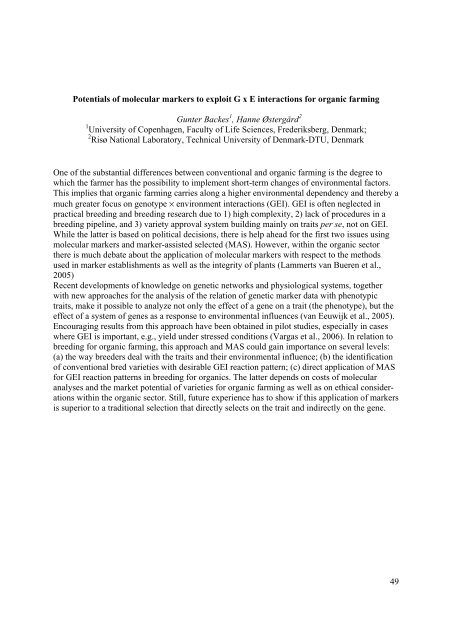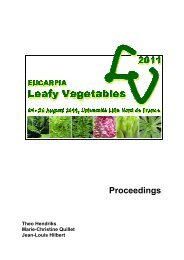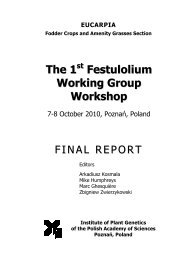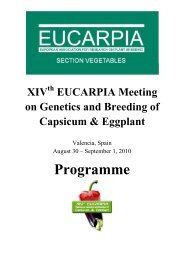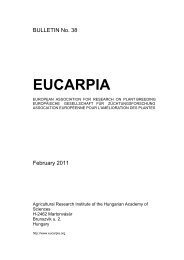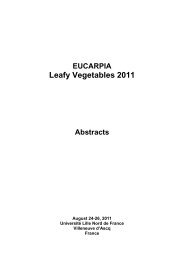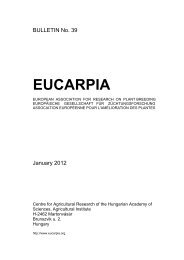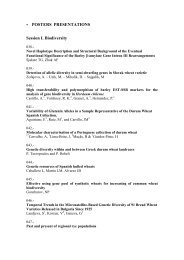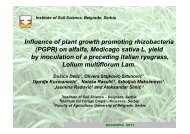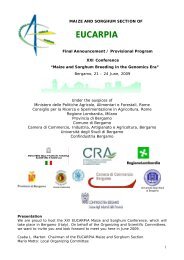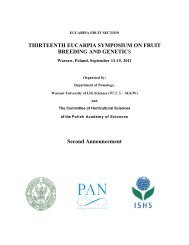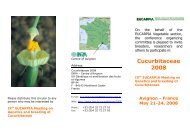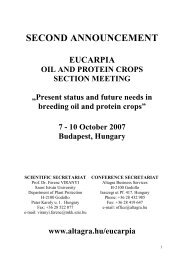Plant breeding for organic and sustainable, low-input agriculture
Plant breeding for organic and sustainable, low-input agriculture
Plant breeding for organic and sustainable, low-input agriculture
Create successful ePaper yourself
Turn your PDF publications into a flip-book with our unique Google optimized e-Paper software.
Potentials of molecular markers to exploit G x E interactions <strong>for</strong> <strong>organic</strong> farming<br />
Gunter Backes 1 , Hanne Østergård 2<br />
1 University of Copenhagen, Faculty of Life Sciences, Frederiksberg, Denmark;<br />
2 Risø National Laboratory, Technical University of Denmark-DTU, Denmark<br />
One of the substantial differences between conventional <strong>and</strong> <strong>organic</strong> farming is the degree to<br />
which the farmer has the possibility to implement short-term changes of environmental factors.<br />
This implies that <strong>organic</strong> farming carries along a higher environmental dependency <strong>and</strong> thereby a<br />
much greater focus on genotype × environment interactions (GEI). GEI is often neglected in<br />
practical <strong>breeding</strong> <strong>and</strong> <strong>breeding</strong> research due to 1) high complexity, 2) lack of procedures in a<br />
<strong>breeding</strong> pipeline, <strong>and</strong> 3) variety approval system building mainly on traits per se, not on GEI.<br />
While the latter is based on political decisions, there is help ahead <strong>for</strong> the first two issues using<br />
molecular markers <strong>and</strong> marker-assisted selected (MAS). However, within the <strong>organic</strong> sector<br />
there is much debate about the application of molecular markers with respect to the methods<br />
used in marker establishments as well as the integrity of plants (Lammerts van Bueren et al.,<br />
2005)<br />
Recent developments of knowledge on genetic networks <strong>and</strong> physiological systems, together<br />
with new approaches <strong>for</strong> the analysis of the relation of genetic marker data with phenotypic<br />
traits, make it possible to analyze not only the effect of a gene on a trait (the phenotype), but the<br />
effect of a system of genes as a response to environmental influences (van Eeuwijk et al., 2005).<br />
Encouraging results from this approach have been obtained in pilot studies, especially in cases<br />
where GEI is important, e.g., yield under stressed conditions (Vargas et al., 2006). In relation to<br />
<strong>breeding</strong> <strong>for</strong> <strong>organic</strong> farming, this approach <strong>and</strong> MAS could gain importance on several levels:<br />
(a) the way breeders deal with the traits <strong>and</strong> their environmental influence; (b) the identification<br />
of conventional bred varieties with desirable GEI reaction pattern; (c) direct application of MAS<br />
<strong>for</strong> GEI reaction patterns in <strong>breeding</strong> <strong>for</strong> <strong>organic</strong>s. The latter depends on costs of molecular<br />
analyses <strong>and</strong> the market potential of varieties <strong>for</strong> <strong>organic</strong> farming as well as on ethical considerations<br />
within the <strong>organic</strong> sector. Still, future experience has to show if this application of markers<br />
is superior to a traditional selection that directly selects on the trait <strong>and</strong> indirectly on the gene.<br />
49


